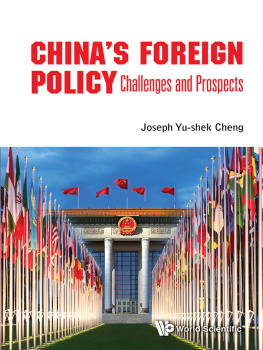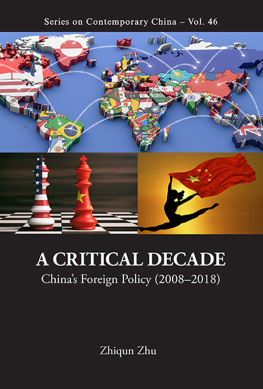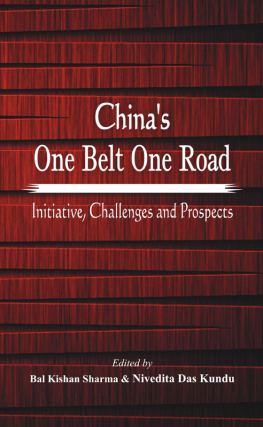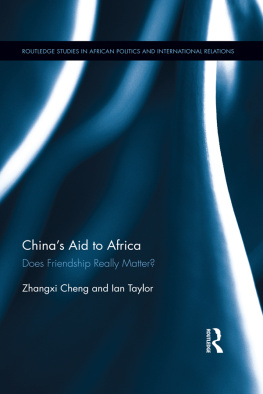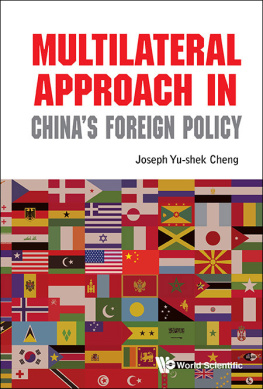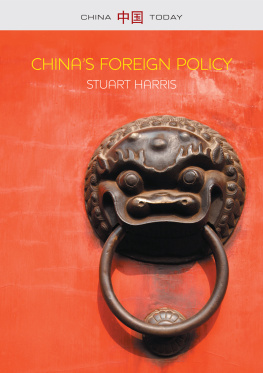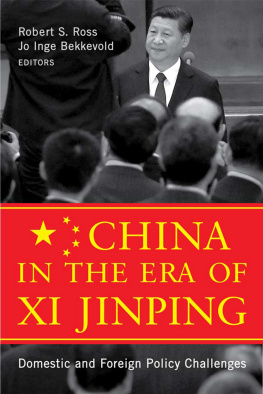CHINAS FOREIGN POLICY Challenges and Prospects
CHINAS FOREIGN POLICY Challenges and Prospects
Joseph Yu-shek Cheng
City University of Hong Kong, Hong Kong
Published by
World Scientific Publishing Co. Pte. Ltd.
5 Toh Tuck Link, Singapore 596224
USA office: 27 Warren Street, Suite 401-402, Hackensack, NJ 07601
UK office: 57 Shelton Street, Covent Garden, London WC2H 9HE
Library of Congress Cataloging-in-Publication Data
Names: Zheng, Yushuo, 1949
Title: Chinas foreign policy : challenges and prospects / Joseph Yu-shek Cheng (City University of Hong Kong, Hong Kong).
Description: New Jersey : World Scientific, 2016.
Identifiers: LCCN 2015031781 | ISBN 9789814719025 (alk. paper)
Subjects: LCSH: China--Foreign relations--1976 | China--Foreign relations--21st century.
Classification: LCC DS779.27 .Z4685 2016 | DDC 327.73--dc23
LC record available at http://lccn.loc.gov/2015031781
British Library Cataloguing-in-Publication Data
A catalogue record for this book is available from the British Library.
Copyright 2016 by World Scientific Publishing Co. Pte. Ltd.
All rights reserved. This book, or parts thereof, may not be reproduced in any form or by any means, electronic or mechanical, including photocopying, recording or any information storage and retrieval system now known or to be invented, without written permission from the publisher.
For photocopying of material in this volume, please pay a copying fee through the Copyright Clearance Center, Inc., 222 Rosewood Drive, Danvers, MA 01923, USA. In this case permission to photocopy is not required from the publisher.
In-house Editors: Dipasri Sardar/Dong Lixi
Typeset by Stallion Press
Email:
Printed in Singapore
This book is dedicated to my wife Grace
Contents
Preface
As China becomes an important actor in global affairs, Chinese leaders realize their responsibility to protect the countrys international interests which have become substantial and complex. They also understand that the nation expects them to raise Chinas international status and influence, and their performance in this arena has become a significant factor contributing to the legitimacy of the Party regime.
While the leadership in Beijing continues to define its world view, its ideological formulation of global contradictions and its foreign policy line, the concept of national interests has gradually become the explicit dominant factor in the actual policy implementation process. As Chinas overall national interests become global and complex, maintaining a proper balance becomes increasingly challenging and compromises have to be made constantly.
Chinas economic growth has much facilitated its ambition to enhance its international status and influence as its military capabilities improve and its resources for economic diplomacy expand. Containing the China threat perception and providing reassurances to its neighbors thus become more difficult tasks. To convince the world of its intention to rise peacefully has remained the main theme of Chinese diplomacy in the post-Mao era, and the leaderships awareness of the significance of soft power has been reflected in the impressive resources now put into public diplomacy.
This volume intends to examine Chinas foreign policy framework and its evolution in the recent decades in the context of its bilateral relations with major powers and important regional countries as well as its handling of various challenges ranging from territorial disputes to energy security. Through a detailed analysis of the actual operation of Chinese foreign policy, it is hoped that the above themes and issues will be better understood. While attempting to consider Chinas foreign policy from its leaderships framework, the author maintains an objective and critical view.
In the past two years when my political activities in pro-democracy movement in Hong Kong brought me substantial pressures, especially from my line supervisor and the City University of Hong Kong, my wife Grace offered me unfailing support which has enabled me to finish this book before my retirement. I am most grateful to my colleagues and friends in the pro-democracy movement whose encouragement given me the strength to maintain my efforts in both my political and academic endeavors. Finally, I would also like to thank the World Scientific Publishing Company for publishing this book and especially Mr. Tiong Chong Wong, Ms. Dong Lixi and Ms. Dipasri Sardar for their superb professional assistance.
Joseph Yu-shek Cheng
1 June 2015
About the Author
Joseph Yu-shek Cheng is the retired Professor of Political Science and Coordinator of the Contemporary China Research Project, City University of Hong Kong. He is the founding editor of the Hong Kong Journal of Social Sciences and the Journal of Comparative Asian Development. He has published widely on the political development in China and Hong Kong, Chinese foreign policy and local government in southern China. His recent publications include Chinas Japan PolicyAdjusting to New Challenges, and The Use of Mao and the Chongqing Model. He served as the Convener of the Alliance for True Democracy in Hong Kong from 2013 to 2014.
Chapter 1
Chinas Foreign Policy: Coping with the Challenge of Power
Plan of the Book
This book intends to examine Chinas foreign policy since the beginning of the era of economic reforms and opening to the external world, with an emphasis on the recent years. It considers the gradual evolution of Chinas foreign policy program in response to Chinese leaders perceptions of the changing international environment and the domestic demands for maintaining the legitimacy of the Communist Party regime. An examination of this evolution process is expected to provide the background for a better understanding of Chinas foreign policy today.
This volume is divided into three parts. The first part consists of four chapters. in 1989, and began to accept deeper integration with the international community symbolized by its decision to join the World Trade Organization (WTO). It also cautiously embraced multilateralism, as demonstrated by its participation in the ASEAN Regional Forum (ARF) in 1994 and its initiative of launching the Shanghai Five process in 1996.
analyzes Chinas foreign policy program in the twenty-first century, focusing on the continuities and changes, with the previous two chapters providing the historical background. Chinese leaders still believe that China needs a peaceful international environment for its modernization, and they are aware of the substantial gaps between China and the advanced countries. But they are certain of Chinas rise as a major power, and the fourth-generation leaders, i.e., Hu Jintao and Wen Jiabao, appeared to have developed a comprehensive foreign policy framework with a harmonious world perspective as its central idea. This perspective is in turn premised on two important concepts: a new security concept and the democratization of international relations.
, Chinas foreign policy under the Xi Jinping administration is considered in detail.



